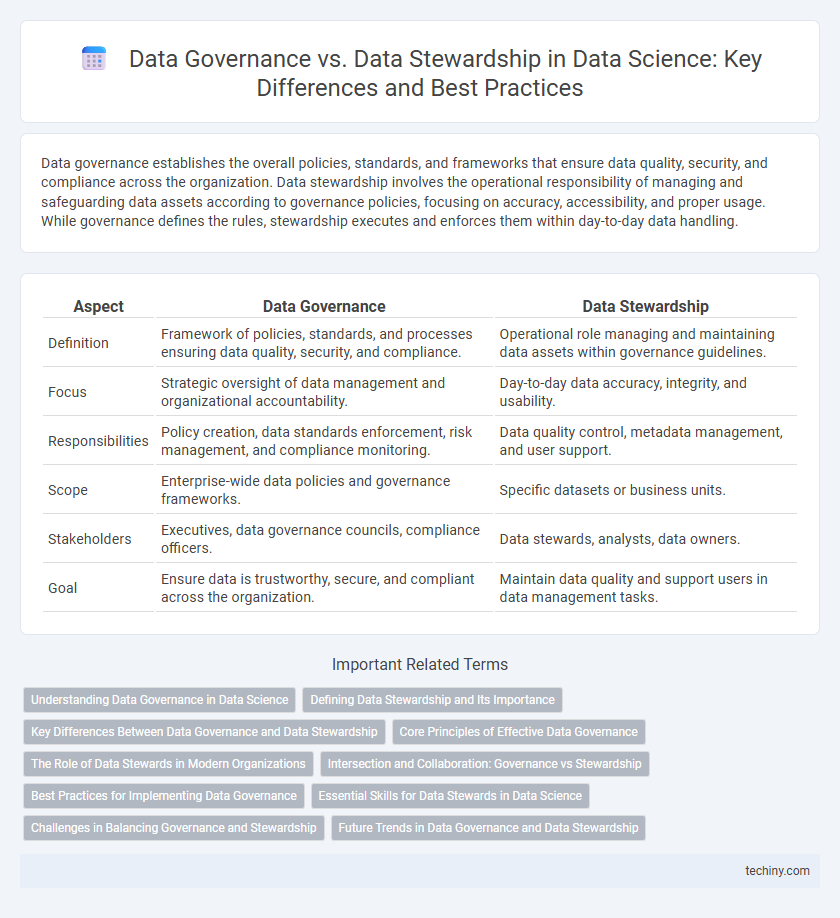Data governance establishes the overall policies, standards, and frameworks that ensure data quality, security, and compliance across the organization. Data stewardship involves the operational responsibility of managing and safeguarding data assets according to governance policies, focusing on accuracy, accessibility, and proper usage. While governance defines the rules, stewardship executes and enforces them within day-to-day data handling.
Table of Comparison
| Aspect | Data Governance | Data Stewardship |
|---|---|---|
| Definition | Framework of policies, standards, and processes ensuring data quality, security, and compliance. | Operational role managing and maintaining data assets within governance guidelines. |
| Focus | Strategic oversight of data management and organizational accountability. | Day-to-day data accuracy, integrity, and usability. |
| Responsibilities | Policy creation, data standards enforcement, risk management, and compliance monitoring. | Data quality control, metadata management, and user support. |
| Scope | Enterprise-wide data policies and governance frameworks. | Specific datasets or business units. |
| Stakeholders | Executives, data governance councils, compliance officers. | Data stewards, analysts, data owners. |
| Goal | Ensure data is trustworthy, secure, and compliant across the organization. | Maintain data quality and support users in data management tasks. |
Understanding Data Governance in Data Science
Data governance in data science establishes the framework for managing data quality, privacy, security, and compliance, ensuring reliable and ethical data usage. It defines policies, standards, and accountability structures that guide data collection, storage, and analysis across the organization. Data stewardship operates within this framework, focusing on the day-to-day management and enforcement of governance policies to maintain data integrity and usability.
Defining Data Stewardship and Its Importance
Data stewardship involves the management and oversight of an organization's data assets to ensure accuracy, privacy, and security throughout the data lifecycle. It plays a crucial role in implementing data governance policies by assigning responsibility to individuals or teams for maintaining data quality and compliance. Effective data stewardship enhances data reliability and supports strategic decision-making within data science initiatives.
Key Differences Between Data Governance and Data Stewardship
Data governance establishes the overarching policies, standards, and accountability frameworks for managing data across an organization, ensuring compliance, security, and quality at a strategic level. Data stewardship involves the operational responsibility of implementing these policies, managing data assets, and maintaining data integrity and accuracy on a day-to-day basis. While data governance defines the rules and decision rights, data stewardship handles the practical application and enforcement of those rules within specific data domains.
Core Principles of Effective Data Governance
Effective data governance hinges on clear accountability, defined roles, and standardized policies that ensure data quality, security, and compliance across an organization. Data stewardship plays a crucial role by managing data assets day-to-day, enforcing governance standards, and facilitating collaboration between business units and IT. Core principles include transparency, responsibility, data integrity, and proactive risk management to maximize data value and maintain regulatory adherence.
The Role of Data Stewards in Modern Organizations
Data stewards play a critical role in modern organizations by ensuring the accuracy, integrity, and security of data throughout its lifecycle, bridging the gap between data governance policies and operational execution. They oversee data quality, enforce compliance with regulatory standards, and facilitate collaboration across departments to maintain data consistency and usability. Effective data stewardship supports robust data governance frameworks, enabling organizations to leverage data as a strategic asset for informed decision-making.
Intersection and Collaboration: Governance vs Stewardship
Data governance establishes the policies, standards, and frameworks for managing data quality, security, and compliance, while data stewardship involves the hands-on management, monitoring, and enforcement of these policies at the operational level. Their intersection lies in collaborative efforts where governance sets the strategic direction and stewardship ensures practical implementation, fostering accountability and data integrity across the organization. Effective collaboration between governance teams and data stewards enhances data reliability, supports regulatory compliance, and drives data-driven decision-making.
Best Practices for Implementing Data Governance
Effective data governance implementation requires establishing clear roles and responsibilities, with data stewardship focusing on managing data quality, security, and compliance on a day-to-day basis. Best practices include defining data policies aligned with organizational goals, creating cross-functional teams for accountability, and leveraging automated tools for monitoring data assets and ensuring regulatory compliance. Continuous training and stakeholder engagement enhance the enforcement of governance standards while empowering data stewards to maintain data integrity.
Essential Skills for Data Stewards in Data Science
Data stewards in data science require expertise in data quality management, metadata governance, and compliance with data privacy regulations such as GDPR and CCPA. Proficiency in data cataloging tools like Collibra or Alation and the ability to collaborate across cross-functional teams ensures effective data stewardship. Strong communication skills and attention to detail enable data stewards to enforce policies and maintain data integrity throughout the data lifecycle.
Challenges in Balancing Governance and Stewardship
Balancing data governance and data stewardship presents challenges such as aligning organizational policies with practical data management tasks, ensuring consistent data quality across departments, and managing conflicting priorities between compliance requirements and user needs. Effective governance frameworks must accommodate flexible stewardship roles to promote accountability without stifling agility. Organizations often struggle to integrate governance controls with stewardship responsibilities, leading to gaps in data accuracy, security, and usability.
Future Trends in Data Governance and Data Stewardship
Future trends in data governance emphasize automation through AI-driven tools that enhance data quality, compliance, and policy management. Data stewardship is evolving to prioritize real-time data monitoring and proactive issue resolution, supported by advanced analytics and collaborative platforms. Integration of blockchain technology is also emerging to ensure data transparency, security, and immutability across governance frameworks.
data governance vs data stewardship Infographic

 techiny.com
techiny.com